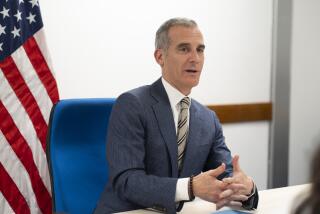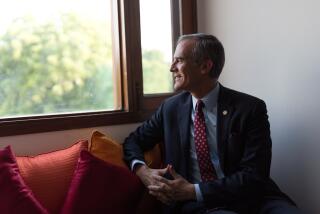Bush Will Find Strong Backing in Passage to India
- Share via
WASHINGTON — President Bush does not typically find relief in travel overseas, rushing through countries whose people and leaders have grown alienated from the United States during his tenure.
But after weeks of unpleasant distractions and sagging approval ratings at home, Bush departs today for a rare place where he and the U.S. remain popular: India.
For the record:
12:00 a.m. March 2, 2006 For The Record
Los Angeles Times Thursday March 02, 2006 Home Edition Main News Part A Page 2 National Desk 1 inches; 43 words Type of Material: Correction
India -- In some editions of Tuesday’s Section A, an article about support for President Bush in India misidentified the Indian American backer of the president who became a campaign “pioneer” by raising at least $100,000. He is Raghavendra Vijayanagar, not Manmohan Singh.
Bush is presiding over the closest ties in history between Washington and New Delhi, two capitals that for decades eyed each other with suspicion as India aligned largely with the Soviet Union and pursued a nuclear arms race with Pakistan.
One recent survey, by the Pew Research Center, found that more than 50% of Indians had at least some confidence that Bush would “do the right thing” when it comes to world affairs -- the highest of any foreign country surveyed.
Despite widespread opposition to the war in Iraq, which is expected to prompt some protests during the visit, and a left-leaning government, more than seven in 10 Indians look favorably upon the United States. Those numbers are a far cry from anti-U.S. sentiment among peoples living in countries that have traditionally been allies, such as Britain and Canada.
Analysts attribute much of the positive feeling to the Bush administration’s campaign against terrorism. India, a nation of 1 billion people that includes 150 million Muslims, has experienced years of terrorist attacks linked to the dispute with mostly Muslim Pakistan over Kashmir.
“The polling the president gets in India is better than the polling he gets here,” said Michael Green, Bush’s former Asia advisor and now a scholar at the Center for Strategic and International Studies. “The Indians see a lot of common purpose between the U.S. and India as multi-religious, multiethnic democracies. Both are concerned about the war on terror, and that sets the basis for this trip and for this relationship.”
Though U.S. popularity may be soaring in India, Bush’s trip will also include a daylong stay in Pakistan, where tensions have risen since a U.S. airstrike aimed at Al Qaeda operatives and the publication of Danish cartoons mocking the prophet Muhammad.
Pakistani President Pervez Musharraf, who took power in a bloodless coup in 1999, has been a key ally in fighting Islamic extremists, though his control over the government and the military has forced Bush to balance the alliance against his call for democracy. Musharraf extended his rule in a disputed referendum in April 2002.
Analysts expect Bush to put only token pressure on Musharraf for political reforms. Bush hinted that his nudging would be friendly when he told a Pakistani television interviewer last week that he would “talk to my buddy and my friend about his goals for a democratic Pakistan.”
Security is likely to be tight. Six years ago, when President Clinton flew to Pakistan from India, he traveled on an unmarked military jet rather than the easily identifiable Air Force One, which was sent ahead as a decoy.
Unlike Clinton, who stuck to political matters in a visit that lasted less than seven hours, Bush will be attending a cricket match and a state dinner.
“The reporting we have is that the demonstrations and the violence associated with the cartoons has subsided,” said Bush’s national security advisor, Stephen Hadley. “It’s very clear that [Bush] wants to go, and that his Pakistani hosts want him to come, and therefore, we’re going.”
The warming of U.S.-Indian relations was initiated by Clinton, but officials in both governments say the relationship has been pushed to new heights by Bush, who has forged political ties with the fast-growing and affluent Indian American community.
Bush has enhanced the relationship by championing an agreement giving India access to updated nuclear technology. Critics of the deal contend that it could transform the balance of power in Asia and reinvigorate a dangerous arms race in an already unstable region.
In India, Bush’s trip is so highly anticipated that local newspapers have devoted weeks of coverage to his three-night stay, contemplating his reported affinity for Indian cuisine.
One local paper, the Indian Express, quoted White House instructions to New Delhi chefs -- cautioning that although the president enjoys Indian food, he does not like it overly greasy or spicy. “Chicken and lamb are his favorites, and he loves kebabs,” said one chef.
The close ties between the United States and India were on display when the Bushes hosted a rare state dinner last July in honor of Prime Minister Manmohan Singh. The guest list included prominent business executives and several Indian American doctors who were among Bush’s most important political donors.
One, Florida heart surgeon Raghavendra Vijayanagar, attended the Washington ceremony and said he hoped to join Bush and Singh for dinner this week in New Delhi. Vijayanagar became a Bush campaign “pioneer” by raising at least $100,000 and was founding chairman of the Indian American Republican Council.
Last year, India hired a prominent Republican lobbying firm now headed by the former U.S. ambassador to India, Robert D. Blackwill, to push for congressional approval of the controversial nuclear deal.
Bush and Singh agreed during their July talks that Washington would work with New Delhi to achieve “normal cooperation” on civilian nuclear energy development and that India would subject its civilian facilities to international monitoring.
The administration contended that India needed foreign help to meet its soaring demand for energy.
India is willing to open 32 of its nuclear facilities to U.N. inspections, whereas the U.S. is pressing for 60 to come under international safeguards, according to Indian reports. Officials had hoped to finalize the deal in time for Bush’s arrival Wednesday, but that appeared unlikely.
“This is not an easy decision for India, nor is it an easy decision for the United States, and implementing this agreement will take time and it will take patience from both our countries,” Bush said in a speech to a meeting of the Asia Society last week.
The deal is one of two aspects of Bush’s India policy that have been controversial at home.
Opponents fear the agreement could allow India to expand its arsenal of atomic weapons and build more powerful nuclear bombs. Rep. Edward J. Markey (D-Mass.), who has organized a bipartisan coalition to oppose the deal, said opening nuclear cooperation with India, which has not signed the Nuclear Nonproliferation Treaty, would undermine decades of U.S. policy.
Bush “seems not to care about the mixed signals he’s sending the rest of the world when he approves a loophole” in the treaty for India, Markey said.
The other tinderbox in domestic politics is the administration’s support of outsourcing -- the practice of corporations transferring jobs overseas in pursuit of inexpensive labor.
The president is planning a day trip to the high-technology center of Hyderabad and a round-table discussion with Indian and U.S. corporate executives -- events designed to accentuate the benefits of stronger economic ties.
“Losing a job is traumatic,” Bush told the Asia Society. “But rather than respond with protectionist policies, I believe it makes sense to respond with educational policies to make sure that our workers are skilled for the jobs of the 21st century.”
Bush will stick to business on his trip to India -- skipping a visit to the country’s most famous symbol, the Taj Mahal.
“I’m going to miss a lot of the really interesting parts of your great country. I know that,” Bush told the Indian journalists.
He blamed his own schedulers. “It goes to show sometimes the president doesn’t get all his wishes,” he told Doordarshan Television.
Wallsten reported from Washington and Watson from New Delhi.
More to Read
Sign up for Essential California
The most important California stories and recommendations in your inbox every morning.
You may occasionally receive promotional content from the Los Angeles Times.










